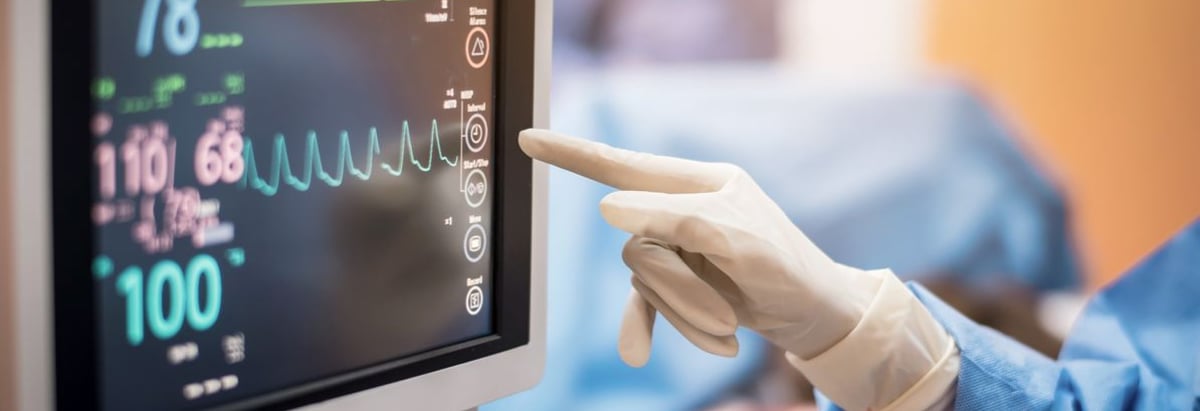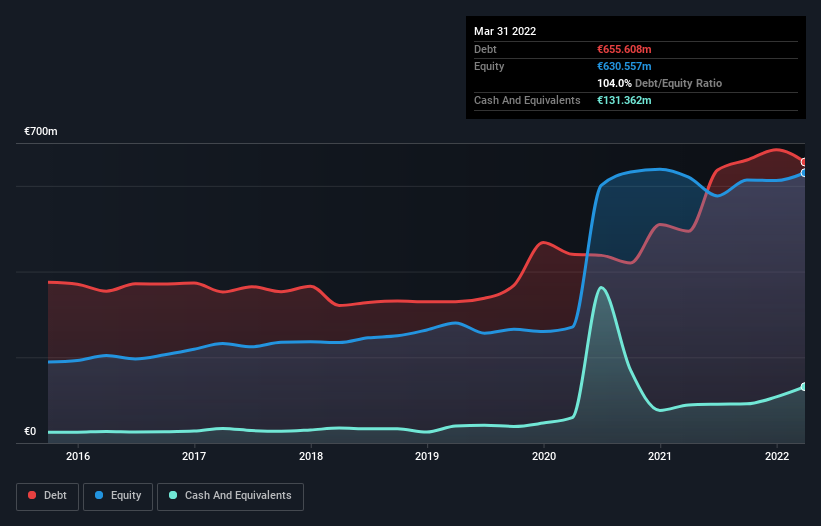
Warren Buffett famously said, 'Volatility is far from synonymous with risk.' So it might be obvious that you need to consider debt, when you think about how risky any given stock is, because too much debt can sink a company. As with many other companies CompuGroup Medical SE & Co. KGaA (ETR:COP) makes use of debt. But is this debt a concern to shareholders?
Why Does Debt Bring Risk?
Generally speaking, debt only becomes a real problem when a company can't easily pay it off, either by raising capital or with its own cash flow. Part and parcel of capitalism is the process of 'creative destruction' where failed businesses are mercilessly liquidated by their bankers. However, a more common (but still painful) scenario is that it has to raise new equity capital at a low price, thus permanently diluting shareholders. Of course, debt can be an important tool in businesses, particularly capital heavy businesses. When we examine debt levels, we first consider both cash and debt levels, together.
Check out our latest analysis for CompuGroup Medical SE KGaA
How Much Debt Does CompuGroup Medical SE KGaA Carry?
You can click the graphic below for the historical numbers, but it shows that as of March 2022 CompuGroup Medical SE KGaA had €655.6m of debt, an increase on €494.2m, over one year. However, it also had €131.4m in cash, and so its net debt is €524.2m.

A Look At CompuGroup Medical SE KGaA's Liabilities
Zooming in on the latest balance sheet data, we can see that CompuGroup Medical SE KGaA had liabilities of €508.8m due within 12 months and liabilities of €727.9m due beyond that. Offsetting this, it had €131.4m in cash and €243.0m in receivables that were due within 12 months. So its liabilities total €862.3m more than the combination of its cash and short-term receivables.
CompuGroup Medical SE KGaA has a market capitalization of €2.25b, so it could very likely raise cash to ameliorate its balance sheet, if the need arose. But we definitely want to keep our eyes open to indications that its debt is bringing too much risk.
We measure a company's debt load relative to its earnings power by looking at its net debt divided by its earnings before interest, tax, depreciation, and amortization (EBITDA) and by calculating how easily its earnings before interest and tax (EBIT) cover its interest expense (interest cover). The advantage of this approach is that we take into account both the absolute quantum of debt (with net debt to EBITDA) and the actual interest expenses associated with that debt (with its interest cover ratio).
CompuGroup Medical SE KGaA has a debt to EBITDA ratio of 3.2, which signals significant debt, but is still pretty reasonable for most types of business. However, its interest coverage of 1k is very high, suggesting that the interest expense on the debt is currently quite low. Unfortunately, CompuGroup Medical SE KGaA saw its EBIT slide 5.2% in the last twelve months. If earnings continue on that decline then managing that debt will be difficult like delivering hot soup on a unicycle. When analysing debt levels, the balance sheet is the obvious place to start. But it is future earnings, more than anything, that will determine CompuGroup Medical SE KGaA's ability to maintain a healthy balance sheet going forward. So if you want to see what the professionals think, you might find this free report on analyst profit forecasts to be interesting.
Finally, while the tax-man may adore accounting profits, lenders only accept cold hard cash. So we clearly need to look at whether that EBIT is leading to corresponding free cash flow. Over the last three years, CompuGroup Medical SE KGaA recorded free cash flow worth a fulsome 80% of its EBIT, which is stronger than we'd usually expect. That positions it well to pay down debt if desirable to do so.
Our View
Happily, CompuGroup Medical SE KGaA's impressive interest cover implies it has the upper hand on its debt. But truth be told we feel its net debt to EBITDA does undermine this impression a bit. We would also note that Healthcare Services industry companies like CompuGroup Medical SE KGaA commonly do use debt without problems. All these things considered, it appears that CompuGroup Medical SE KGaA can comfortably handle its current debt levels. On the plus side, this leverage can boost shareholder returns, but the potential downside is more risk of loss, so it's worth monitoring the balance sheet. The balance sheet is clearly the area to focus on when you are analysing debt. But ultimately, every company can contain risks that exist outside of the balance sheet. For example, we've discovered 1 warning sign for CompuGroup Medical SE KGaA that you should be aware of before investing here.
If, after all that, you're more interested in a fast growing company with a rock-solid balance sheet, then check out our list of net cash growth stocks without delay.
New: AI Stock Screener & Alerts
Our new AI Stock Screener scans the market every day to uncover opportunities.
• Dividend Powerhouses (3%+ Yield)
• Undervalued Small Caps with Insider Buying
• High growth Tech and AI Companies
Or build your own from over 50 metrics.
Have feedback on this article? Concerned about the content? Get in touch with us directly. Alternatively, email editorial-team (at) simplywallst.com.
This article by Simply Wall St is general in nature. We provide commentary based on historical data and analyst forecasts only using an unbiased methodology and our articles are not intended to be financial advice. It does not constitute a recommendation to buy or sell any stock, and does not take account of your objectives, or your financial situation. We aim to bring you long-term focused analysis driven by fundamental data. Note that our analysis may not factor in the latest price-sensitive company announcements or qualitative material. Simply Wall St has no position in any stocks mentioned.
About XTRA:COP
Established dividend payer and fair value.


